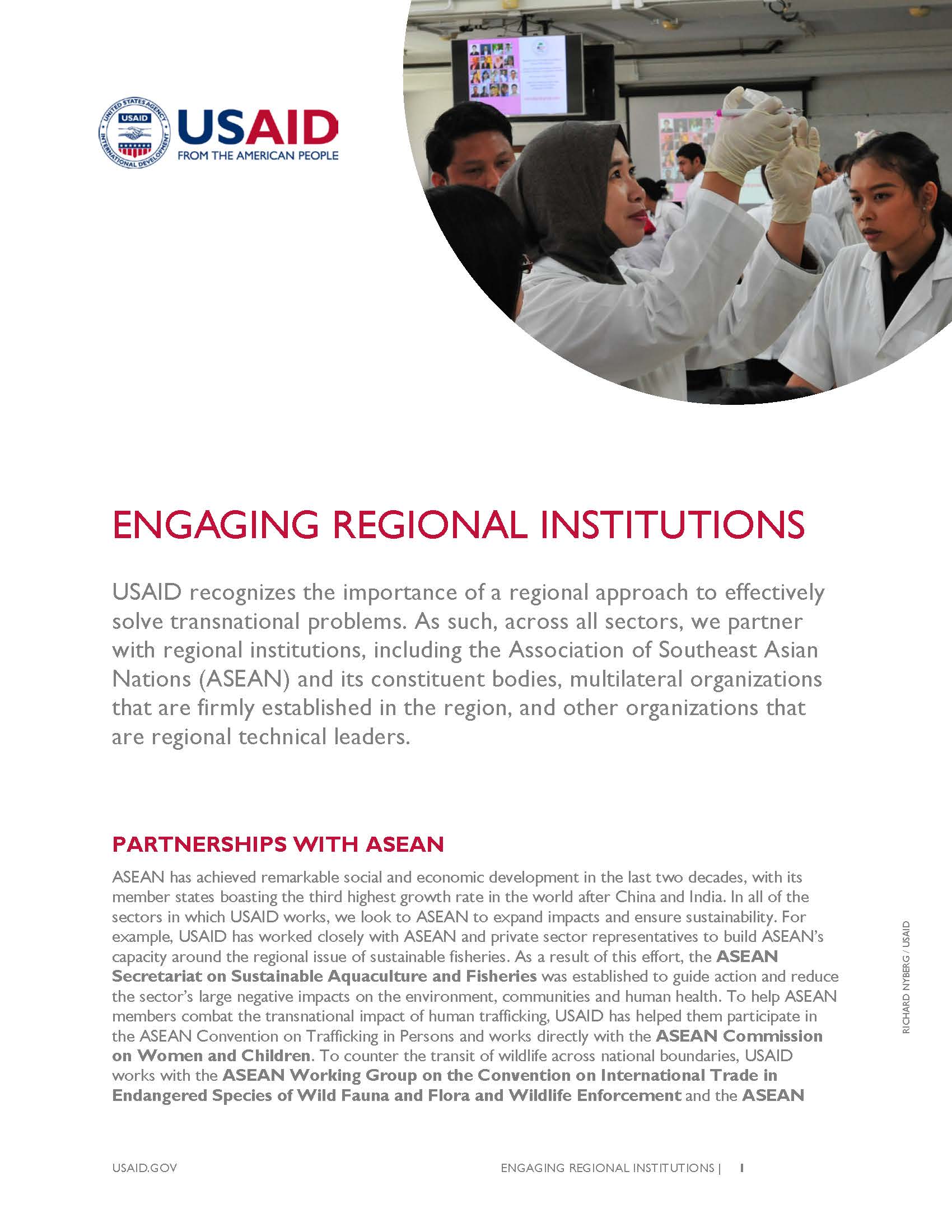Speeches Shim
Engaging Regional Institutions ![]() (pdf - 218k)
(pdf - 218k)
USAID recognizes the importance of a regional approach to effectively solve transnational problems. As such, across all sectors, we partner with regional institutions, including the Association of Southeast Asian Nations (ASEAN) and its constituent bodies, multilateral organizations that are firmly established in the region, and other organizations that are regional technical leaders.
PARTNERSHIPS WITH ASEAN
ASEAN has achieved remarkable social and economic development in the last two decades, with its member states boasting the third highest growth rate in the world after China and India. In all of the sectors in which USAID works, we look to ASEAN to expand impacts and ensure sustainability. For example, USAID has worked closely with ASEAN and private sector representatives to build ASEAN’s capacity around the regional issue of sustainable fisheries. As a result of this effort, the ASEAN Secretariat on Sustainable Aquaculture and Fisheries was established to guide action and reduce the sector’s large negative impacts on the environment, communities and human health. USAID supports ASEAN members to implement the ASEAN Convention on Trafficking in Persons. To counter the transit of wildlife across national boundaries, USAID works with the ASEAN Working Group on the Convention on International Trade in Endangered Species of Wild Fauna and Flora and Wildlife Enforcement and the ASEAN Inter-Parliamentary Assembly. To promote investments in large-scale, grid connected renewable energy and to promote investments in low emissions land use, USAID projects work closely with the ASEAN Center for Energy and the ASEAN Banking Association, respectively. USAID recognizes that infectious diseases can become global security threats, and supports technical research through the recently-created ASEAN Coordinating Center for Animal Health and Zoonoses, as well as the ASEAN Sectoral Working Group on Livestock.
INTERACTION WITH OTHER REGIONAL ENTITIES
In addition to ASEAN-affiliated bodies, USAID works with other institutions that have regional reach and multilateral organizations that are active in the region. For instance, in the fisheries sector, USAID coordinates with the Southeast Asian Fisheries Development Center and also the Coral Triangle Initiative Secretariat on a catch traceability system that is reducing illegal fishing and increasing transparency of fisheries practices. In the water management sector, USAID partners with NASA to improve utilization of geospatial data to reduce the impact of disasters and works closely with the Asian Development Bank’s Greater Mekong Subregion, and the Mekong River Commission. This project is implemented by the Asia Disaster Preparedness Center.
Recognizing the critical role of academic networks in surveillance of animal to human disease transmission and its response, USAID also works with the Southeast Asia One Health University Network. Other regional entities that USAID actively coordinates with to address infectious diseases include: the Regional Field Epidemiology Training Program for Veterinarians, the Mekong Basin Disease Surveillance, the Asia Partnership on Emerging Infectious Disease Research, the Asia-Pacific Leaders Malaria Alliance, the Asia-Pacific Malaria Elimination Network, and the Asian Collaborative Training Network for Malaria.
USAID works closely with many multilateral organizations that help set global standards, including: the World Health Organization, The Global Fund to Fight AIDS, Tuberculosis and Malaria and OIE–The World Organization for Animal Health.
CONTACT
USAID Regional Development Mission for Asia
Telephone: +66 (2) 257-3000
Email: info-rdma@usaid.gov


Comment
Make a general inquiry or suggest an improvement.